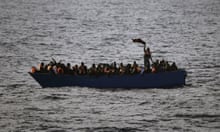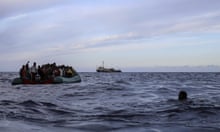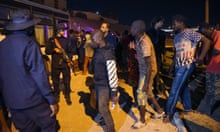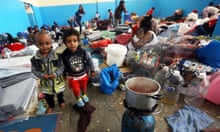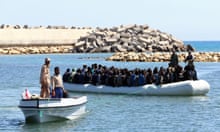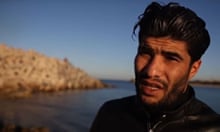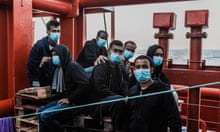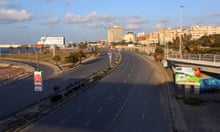A plan for a voluntary evacuation of migrants in Libya government-controlled detention camps has been put at the heart of an emergency migration plan for Africa.
Leaders from the European Union and the African Union arrived for a summit in Ivory Coast on Wednesday vowing to take action following CNN’s shocking video footage of slave auction houses in Libya.
Emmanuel Macron, the French president, described the abuse of migrants as “a crime against humanity” and said that the EU and AU would “launch concrete military and policing action on the ground to dismantle those networks”.
In an interview with France 24, Macron said he was not advocating sending foreign troops to Libya, adding: “It’s not about declaring war, Libya is a state in political transition ... but there’s reinforced police action that needs to be done to dismantle those networks. We’ll do it.”
He also called for “individual, financial and physical sanctions” against human-trafficking networks, which he said were closely linked to terror groups in the region.
The plan, which could see up to 15,000 people flown out of Libya, requires the government to allow the UN’s evacuation planes to land, as well as for source countries to come to a holding centre in Tripoli and take back their citizens. Migrants without documentation would be held until their case is resolved.
The EU is likely to provide the funding, which in effect dramatically speeds up a voluntary repatriation scheme already being run by the International Organization for Migration.
Opening the summit, the Ivorian president, Alassane Ouattara, said: “Given this wretched drama which recalls the worst hours of human history, I would like to appeal to our sense of responsibility to take all urgent measures to put an end to this practice, which belongs to another age.”
Some African leaders also expressed anger at the Libyan government, with the Nigerian president, Muhammadu Buhari, claiming it was appalling that his compatriots were being sold “like goats”.
In a rare press conference on Thursday, the Libyan embassy in London said every effort was being made to investigate claims of slavery auction markets, adding anyone found guilty would be charged under a 1953 law banning slavery.
Mohamed Alkoni, the Libyan charge d’affaires, insisted throughout his life he had “never seen or heard any signs of racism in Libya”, and added any proven allegations of slavery “is an act of an individual, and not a systematic practice”.
The practices, if proven, “contravene all the values, traditions and customs of the Libyan people”, he said.
No cases had been put before the Libyan courts prior to the CNN allegations, he said, suggesting that the news of the slave auctions had come as a surprise to ministers.
He also said the Libyan state lacked the resources to oversee the detention centres fully. “You are talking about a large number of detention centres and it is not easy to control them”.
Quick GuideModern slavery
Show
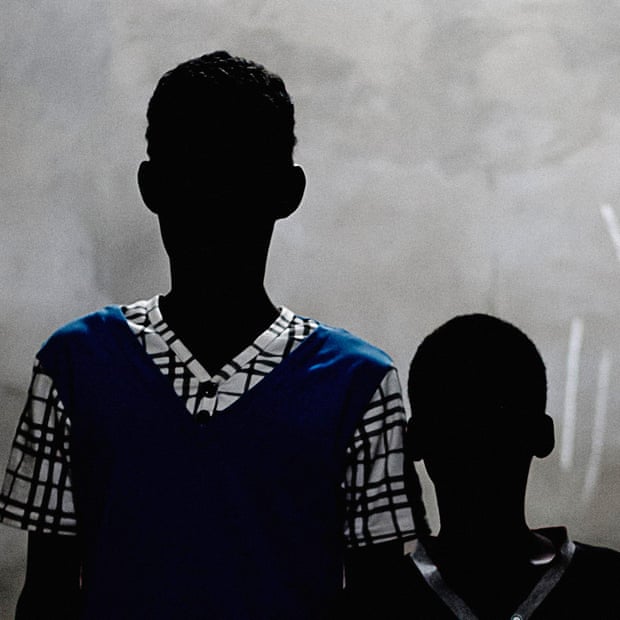
What is modern slavery?
About 150 years after most countries banned slavery – Brazil was the last to abolish its participation in the transatlantic slave trade, in 1888 – millions of men, women and children are still enslaved. Contemporary slavery takes many forms, from women forced into prostitution, to child slavery in agriculture supply chains or whole families working for nothing to pay off generational debts. Slavery thrives on every continent and in almost every country. Forced labour, people trafficking, debt bondage and child marriage are all forms of modern-day slavery that affect the world's most vulnerable people.
How many people are enslaved across the world?
The UN's International Labour Organisation (ILO) estimates that about 21 million people are in forced labour at any point in time. The ILO says this estimate includes trafficking and other forms of modern slavery. They calculate that 90% of the 21 million are exploited by individuals or companies, while 10% are forced to work by the state, rebel military groups, or in prisons under conditions that violate ILO standards. Sexual exploitation accounts for 22% of slaves.
Where does slavery exist?
Slavery exists in one form or another in every country. Asia accounts for more than half of the ILO's 21 million estimate. In terms of percentage of population, central and south-east Europe has the highest prevalence of forced labour, followed by Africa, the Middle East, Asia Pacific, Latin America and the Caribbean.
Who is profiting?
In 2005, the ILO estimated that illegal profits from forced labour amounted to more than $44bn. The UN's global initiative to fight trafficking says people trafficking is the third-largest global criminal industry (pdf) behind drugs and arms trafficking. The ILO estimates that people in forced labour lose at least $21bn each year in unpaid wages and recruitment fees. Slavery also exists within global supply chains, generating huge profits for those who control this industry in free labour.
Migration was already at the top of the agenda for the first AU-EU summit since 2014, but the footage of markets in Libya injected immediacy into the issue, spurring French government calls at the UN on Tuesday for sanctions against identified traffickers, the closure of migrant detention camps and renewed calls for Europe to accept more African migrants on a managed basis.
More than 3,000 migrants have died trying to cross the Mediterranean to Italy this year, it was confirmed this week.
AU states are eager to ensure that the Libyan crisis does not detract from an agenda to address the long-term causes of migration, including poor governance, climate change and absence of private sector investment. They also want EU commitments on the number of migrants it is willing to take. France has promised to accept at least 3,000 from Niger and Chad over two years.
Both Macron, and the German chancellor, Angela Merkel, have promised to make Africa a priority, but details of EU funds for Africa are often opaque.
Macron is on a three-day tour of Africa and, in his first major address on the continent before a crowd of university students in Burkina Faso on Tuesday, said he wanted Africa and Europe to “help populations trapped in Libya by providing massive support to the evacuation of endangered people”.
Conscious that France, by backing the ousting of Muammar Gaddafi in 2011, is seen as having a large share of responsibility for Libya’s current political disarray, Macron reiterated his criticisms of French intervention in Libya under Nicolas Sarkozy in 2011. “I would not have supported the intervention in Libya,” he said, “because there was not a diplomatic vision or diplomatic solution.”
Quick GuideWhy is Libya in chaos?
Show
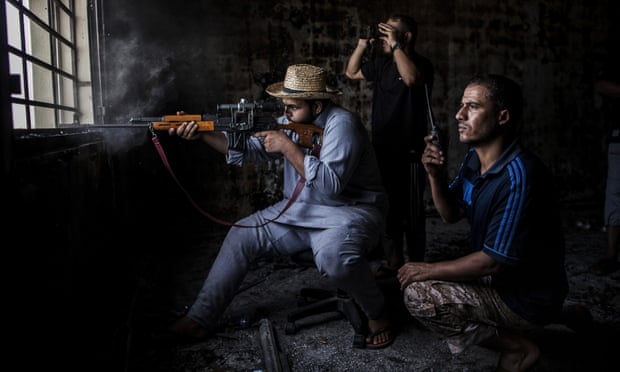
What happened after the Libyan revolution?
Muammar Gaddafi was ousted as president in 2011 after more than 40 years in power. But deep division between his supporters and adversaries persisted. An internationally recognised National Transitional Council took over, but quickly succumbed to schism, particularly between east and west.
How did things get so chaotic?
The transitional authorities found it impossible to extend their writ across the whole country, which was splintering into myriad factions: former regime loyalists, revolutionary brigades, local militia, Islamists, old army units, tribes, people trafficking gangs.
What about elections?
A General National Congress was elected in 2012 and established itself in Tripoli. But when a national parliament was elected in 2014, the GNC refused to accept the result; the new body had to install itself in the eastern city of Tobruk. Libya now effectively had two governments - the former buttressed by Islamist militias in its Tripoli stronghold, the latter supported by Khalifa Haftar, a renegade army colonel now head of the armed forces.
What about the international community?
Libya has become too unsafe for diplomats and most aid workers. The UN pulled its staff out in 2014 and foreign embassies followed suit. Tripoli international airport is largely destroyed by fighting.
Where has this left Libya?
The conflict has killed 5,000, ruined the economy, driven half a million from their homes and trapped hundreds of thousands of migrants seeking to get north to Europe in a nightmarish network of brutal camps. Diplomatic attempts at reconciliation have proven fruitless thus far.
Taking questions from the students in Burkina Faso, Macron downplayed the idea of European countries opening their doors to more direct migration from Africa. “If you say, ‘I’ve got a right to total access without conditions’ ... I can’t explain that to my [lower middle class], who have worked, who pay their taxes,” he said. “What do I tell them?”

